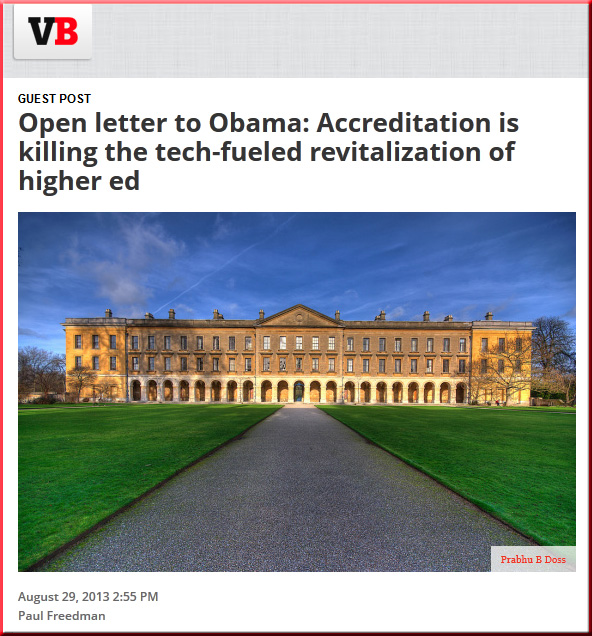Issue #1: Accreditation
OPINION: How to make college better & more affordable — from edsurge.com by Paul Freedman
One powerful answer: Reform the accreditation process
Excerpt (emphasis DSC):
How can our diverse, 4,300 two- and four-year schools collectively be failing to produce the outcomes we need, at the scale we need them, all at the same time?
How can this be?
…
…why have these solutions not yet driven the fundamental change the system needs? Innovators that could bring costs down and help our system stay on the leading-edge are being stifled by little-known organizations that possess tremendous unregulated power in higher education: accreditors. As a result, our system is sick–plagued by an institutionalized lack of adaptation.
…
If they are indeed stewards of the public trust responsible for ensuring the quality of our higher education system, then they are also responsible for its outcomes and therefore share a large portion of the blame for the failures in higher education that we see today. Accreditation is the one constant across all US higher education institutions.
…
The problem? Ivy Bridge wanted to change the status quo.
Also see:
A relevant side note from DSC:
The following statement in Downgrading Elite Colleges (InsideHigherEd.com) shows the impact of this straitjacketing, status quo situation (emphasis mine):
“We do see pressure on small private colleges as a group and that’s primarily because they don’t have a lot of different things they can do, so they are primarily dependent on tuition revenue,” said a Moody’s analyst, Edie Behr.
Moody’s advises institutions to try to diversify their revenue streams.
That is not an easy task, said Oberlin’s vice president for finance, Ronald Watts.
…they don’t have a lot of different things they can do…
…that is not an easy task…
Are these statements true? If so, why?
Is accreditation part of the issue/solution?
Who should be on the accrediting bodies? Whose agenda(s) do they represent?
(Related) Issue #2: Only doing what one’s peer groups are doing.
From DSC:
If the entire boat is sinking, does it matter what your peers are doing?!? Isn’t it time for bigger thinking? Bolder thinking? More (and careful/well-thought-through) experimentation?
Paul Freedman states this as well in his article:
I have heard people in the industry compare the current state of higher education to a sinking ship. If that is accurate, then accreditors should be viewed as the ones who are literally nailing down the deck chairs to the Titanic. We need to keep the students we are all dedicated to serving from going down with the ship. We, as the education industry and as US citizens, need to fight for accreditation reform.
I ask these questions and pose the above picture not to promote panic — but rather to strongly encourage change. Institutions of higher education need to adapt in order to stay relevant, survive, and to properly equip future generations for the world they will be entering.
If not, students will find other ways to be successful — and so will corporations.
Addendum on 9/3/13:
- Higher Ed Accrediting Commissions: Transparency for thee, not for me — from mfeldstein.com by Phil Hill
Excerpt:
Why do I keep covering accreditation issues on e-Literate, a blog nominally about online learning and educational technology? The reason is that accrediting commissions have enormous influence on higher education institutions, particularly as the industry wrestles with questions of which changes are necessary, which changes are worth trying but might not work, and which changes should be avoided. If there really is a shift in the DOE’s views on accreditation or in the accrediting commissions’ interpretation of standards, then that could have fairly profound cascade effects on competency-based learning programs, private online colleges, MOOCs, and online service providers.That is also why the lack of transparency from the accrediting commissions is so troubling. They are making decisions that have profound effects on many institutions, not just the specific schools under review.










